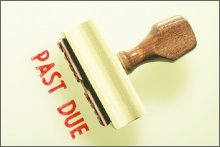Paying Your Old Bills Can Actually HURT Your Credit -- What You Need to Know
by www.SixWise.com
Owing money--for credit card bills, mortgages, student loans
and everything in between--has become the American way. In
all, American consumers owed nearly $2 trillion as
of October 2003, according to the Federal Reserve.
When you break this down, that's over $18,500 of debt for
the average household--without a mortgage. In fact, about
43 percent of families spend more than they earn each year,
and the average household has $8,000 in credit card debt alone.
|

When it comes to paying debt, "It seems so easy,
but it's not," says Steve Rhode, a private money
counselor and co-founder of a Maryland-based credit-crisis
counseling firm.
|
Accounting 101
The equation seems relatively simple. Spend more than you
earn, and you accumulate debt. When you have more money coming
in (or fewer expenses), you put that money toward paying off
your debt, your credit score improves, and all is well.
In reality, however, it's not nearly this simple. Creditors
and collection agencies are sneaky, and there are all kinds
of games going on that complicate the process of getting out
of debt. Morally, it may be the right thing to pay off an
old debt, no matter what, but financially, this is not always
the case. Here are several circumstances when paying off a
debt can actually hurt your credit.
Statute of Limitations
Every state has a statute of limitations that limits the
amount of time a creditor has to sue you for a delinquent
account. This can range from three to 15 years, but generally
most states set it at five or six years. However, it is possible
to accidentally extend the statute of limitations just by
calling a creditor to inquire about an old debt, or by acknowledging
that the debt is yours. These rules vary by state, so be sure
to find out your own state's laws on the matter.
Another useful bit of information is that bad marks on your
credit report can only be reported for 7.5 years (10 years
for bankruptcies). After that, they fall off your record,
so paying off the debt won't affect your credit score.
|

Should you pay your past debts? "If you can afford
to pay, pay," says Rhode. "Too many people
live and die by what their credit report says."
|
Charge-Offs: When it's Beneficial to Pay Up
After six months of no payments, a creditor can write off
your account as a bad debt. This is called a "charge
off," and is bad news for your credit score. The creditor
will usually then turn the account over to a collection agency,
and you'll have two separate entries on your credit score
for the same debt.
What really matters for your FICO credit score (the one used
by most lenders) is what the original creditor entry says.
If your entire balance is there, paying off the collection
agency and then contacting the original creditor to zero out
your account may improve your credit.
But, if the original creditor entry shows a zero balance
(because it was transferred to collections), which is often
the case, there will be no improvement to your credit score--even
if you pay off the debt.
|
Degunk Your Personal Finances
 Learning
how to take control of your financial life, eliminating
stress, and achieving your goals is possible, and quite
easy to achieve, with the help of a simple, proven,
12-step plan explained in the very informative new book,
"Degunking Your Personal Finances." With this
book, you will: Learning
how to take control of your financial life, eliminating
stress, and achieving your goals is possible, and quite
easy to achieve, with the help of a simple, proven,
12-step plan explained in the very informative new book,
"Degunking Your Personal Finances." With this
book, you will:
-
Create and understand your current financial
situation. (chapter 4)
-
Learn a quick and easy way to manage your monthly
bills. (pgs. 29-37)
-
Find out how much you spend and where your money
goes. (Chapter 11)
-
Use the proven formula that will ensure elimination
of credit card debt. (pgs. 100-101)
-
Become familiar with ways to invest for the
future and improve your financial security. (Chapters
16 & 17)
-
Build your savings. (Chapter 9)
-
Gain true knowledge on home mortgages -- fixed
vs. adjustable rates. (pgs. 123-127)
-
Familiarize yourself with your credit report and
drastically improve your credit score. (Chapter
10)
-
Understand how to put strategies in place to
help you cope with unexpected events that can leave
you financially burdened. (Chapter 17)
-
Get useful tips on how to save on clothing, vehicle
purchases, vacations, home repairs. (Chapter 12)
-
Find hidden money -- these
amazing tips are worth the price of the book alone!
(pgs. 256-269)
You don't have to put it off another day -- learn
more about "Degunking Your Personal Finances"
now!
|
Settling Old Debts
While settling an account for less than what was originally
owed may seem like a good idea, and will appease the creditor,
it can actually hurt your FICO score.
"Settling the account can add a new element to its record
at the bureau. Since that element's date would be more recent
than the original item, it can end up lowering the score,"
said Craig Watts, spokesman for Fair Isaac Corp., the creators
of the FICO credit scoring system.
In this case, it might be better to leave the account open
and unpaid. Further, if you do settle, another collection
agency may still contact you and try to collect the unpaid
portion. Or, the collector could tell the Internal Revenue
Service that you've received "income" from the settled
debt--income that you'll owe taxes on.
Paying on Old Debts
The more recent the debt, the greater its impact on your
credit score. If you have an old debt,
then decide to make a payment, it could update the delinquency,
making it look more recent. The end result? A lower
credit score.
If you want to know more, the Federal Trade Commission has
a
brochure that outlines the basics of fair debt collection
and consumer rights that everyone needs to know.
Recommended Reading
How
to Get the Greatest Tax Advantages by Donating Money to Charity
The Six Debt Triggers
for Women
Sources
When
Paying Bills Can Hurt Your Credit
MSN
Money: How Does Your Debt Compare?
Zombie
Debt Collectors Dig Up Your Old Mistakes
12
Tips for Negotiating with Debt Collectors